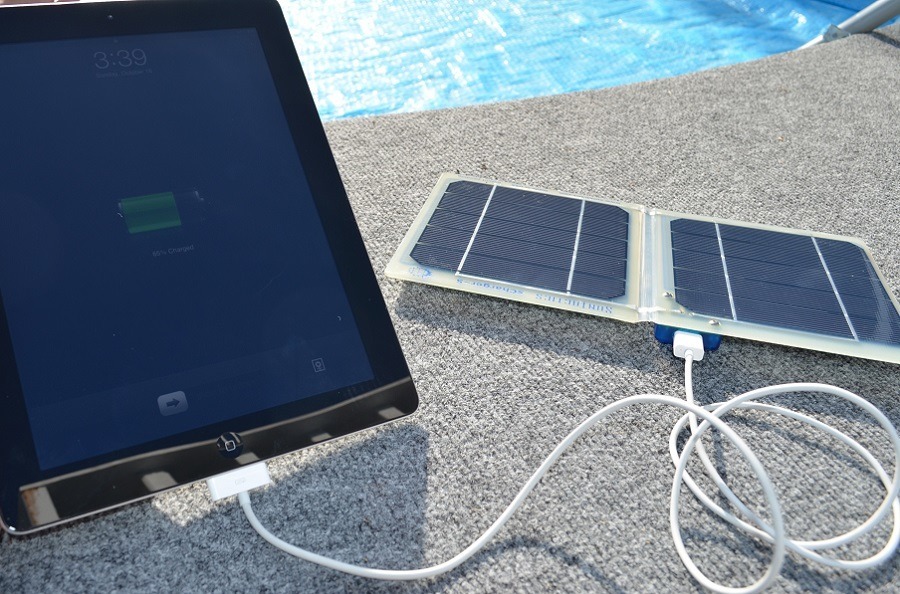As technology has progressed, so has our need for and reliance upon electronic devices. Unfortunately, the better that devices such as smartphones become, the worse the battery life seems to get. If you are one of the millions of people who uses their phone for basically everything, this short battery life can be your downfall.
Thankfully, better technology means more ways to charge and power all of our favorite electronic devices. One of these ways is solar power. Solar power isn’t exactly a new technology, but it has improved significantly over the years. One of the results of this is solar panel chargers.
When one hears the term “solar power,” it’s easy to envision multiple solar panels dispersed on a rooftop, or maybe a giant hoard of solar panels in the desert, all working to provide energy for a nearby city.
While this is certainly understandable, solar panel chargers are a much simpler endeavor. These chargers harness the most basic aspect of solar energy, and utilize it as a way to charge your smaller devices when you are away from standard electrical sources.
What Exactly is a Solar Panel?
Solar panels are the heart of solar technology. These panels are mostly made from silicon cells that work to capture energy from the sun, and help convert it to actual electrical power.
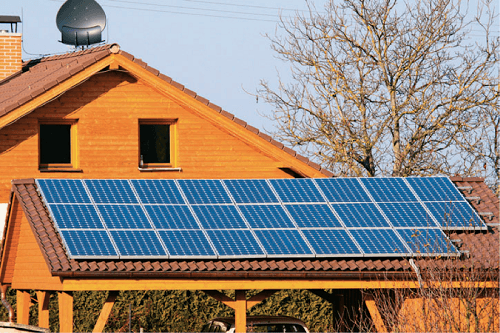
The process is actually more simple than you probably assume. The sun’s rays emit proton energy. Solar panels absorb the photons that come from the sun’s energy, which is what creates the resulting electrical current. This process is known as the Photovoltaic Effect.
The energy that is created from the photons hitting the surface of the solar panel causes the electrons to be disrupted from their orbits, and then released into the electric field that has been generated by the solar cells. The cells in the panels then pull the electrons into a directional current, which is then either transferred through the circuit and to a device, to a power grid, or to a battery.
Types of Solar Panels
There are several types of solar panels in existence, but really just two main types, especially when it comes to portable solar panels.
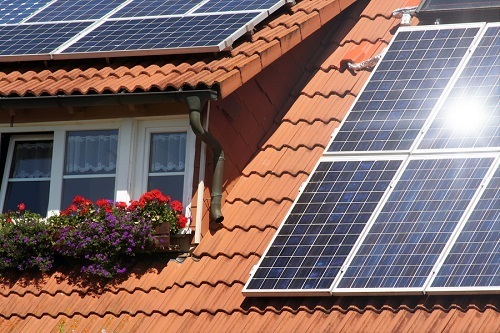
Monocrystalline Solar Panels
Monocrystalline panels contain cells made from silicon ingots that have their edges cut off, which gives them a rounded square-like appearance. Monocrystalline is a very pure form of silicon, making these panels extremely efficient.
Since monocrystalline panels convert sunlight more efficiently they don’t require as much space, which means a smaller panel. Monocrystalline panels also have the longest lifespan, and can perform better under low-light conditions.
Polycrystalline Solar Panels
Polycrystalline panels are made using a different process than monocrystalline panels. With these panels, raw silicon is melted down to a liquid form, and then poured into square molds. Once the silicon cools, the panel is created. This results in the blue, almost window-like look often associated with solar panels.
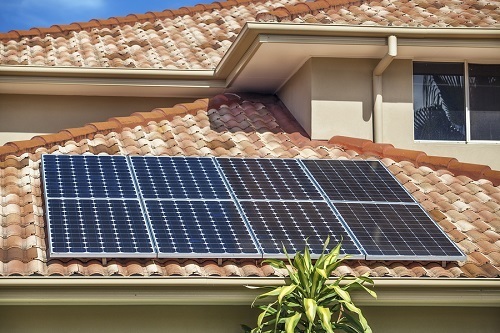
These panels are not quite as efficient as monocrystalline, which can sometimes mean a larger size and weight.
What is a Solar Panel Charger?
When solar panels were first being used, they were generally utilized for scenarios that involved a lot of power being created. The panels were mounted to set up in groups, and then wired to grids, generators, batteries, and the like. These systems powered entire buildings or homes from the sun.
Eventually other forms of solar power systems came along, which are essentially smaller versions that don’t produce as much power. Portable solar generators are a great example of this. With just a solar panel or two, one can effectively charge the power pack in the generator to provide electrical power for everything from lights, to phones, to electric tea kettles.
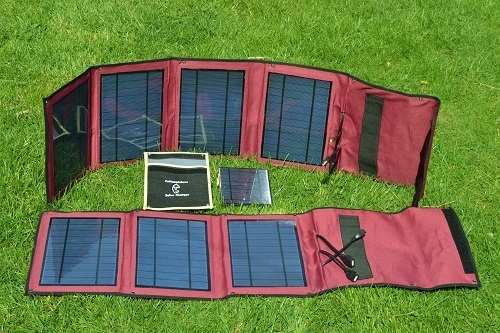
These types of solar power kits and systems are perfectly suitable for the uses in which they are intended, but aren’t exactly mobile in the sense of being able to easily carry them around with you. These systems rely on transferring power from the panel, into the power pack, and then out into your device or appliance, so you need multiple pieces of equipment.
Solar panel chargers are a solution to these issues. With a solar panel charger, you can charge directly from the panel and into your device, bypassing the need for an inverter or power pack. Think of a solar panel charger like an electrical outlet: if the sun is out, the outlet is working.
These chargers provide adequate power straight from the sun and right into your device, making it easy for you to keep your electronics charged wherever there is sun, without the need for finding an outlet, or carrying a spare battery around.
What Can Solar Panel Chargers Be Used For?
Solar panel chargers can be used to power a wide variety of small devices and electronics in many different ways.
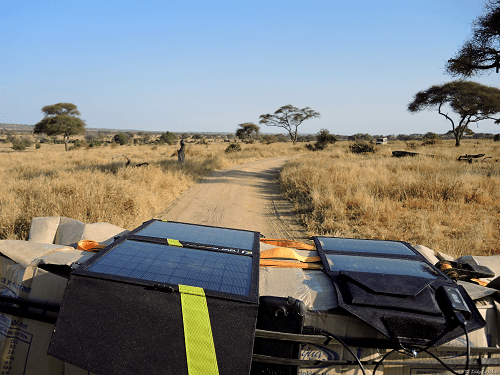
It’s important to keep your expectations realistic, however. Don’t expect your solar panel to be able to charge as fast as a standard wall outlet, or be able to power larger devices. If you purchase a solar panel charger to power small devices like phones and standard batteries, you’ll be perfectly happy with it.
Solar panel phone chargers, solar panel USB chargers, and solar panel battery chargers are all readily available, and very effective in their performance when used correctly.
Benefits of Solar Panel Chargers
These types of chargers offer users several benefits, almost all of which have to do with the portability itself.
Smartphone batteries are constantly draining, even when the phone is sitting in your pocket. Standard wall chargers, USB chargers, and car chargers all help to keep your phone powered when nearby, but what about when you are away from these for whatever reason? Many smartphones, including iPhones, don’t give you the option to carry an extra battery around with you.
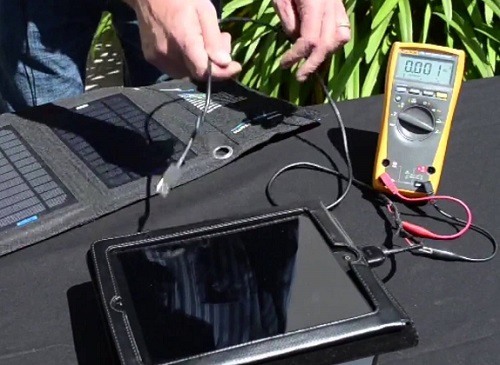
If you are outdoors and away from electrical power, a solar panel charger can be a lifesaver. Simply set the panel in the sun, hook it up to your phone, and sit back and watch your phone recharge. The charger never runs out as long as the sun is out.
Solar panel chargers are also relatively lightweight, and often fold away for easy storage. Some models even have room inside to store other small items, including your actual charging cord.
Types of Solar Panel Chargers
Solar panel chargers vary in their use, along with what devices they can support, and how many at one time.
Solar Panel Phone Charger
This is perhaps the most popular type of solar panel charger. These chargers tend to be slightly smaller, and have a minimum of one outlet, often two. The cord that protrudes from the panel usually has multiple ends that are interchangeable to match whichever phone you are using.
The wattage is suitable for mainly phone charging, although it can be used for other devices, just not as effectively.
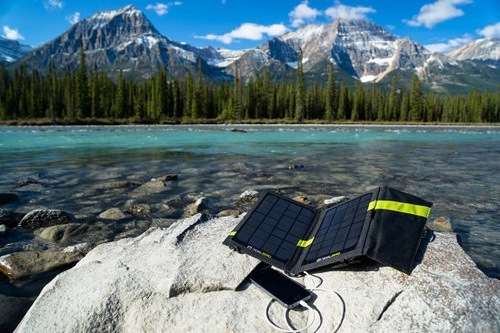
Solar Panel USB Charger
These chargers are a little more versatile. They often have two USB outlets, which can be used to power any number of devices that have USB charge connections. This can include phones, tablets, and Go Pros. The wattage tends to be a little higher with USB chargers as well, which allows the unit to power more than one device at one time.
Solar Panel Battery Charger
Rechargeable alkaline and lithium batteries have been around for quite awhile now. However, these chargers had to be plugged into an outlet to provide power to charge the batteries. Solar panel battery chargers rely on sunlight instead, and can effectively recharge batteries just as well as an AC plug in battery charger.
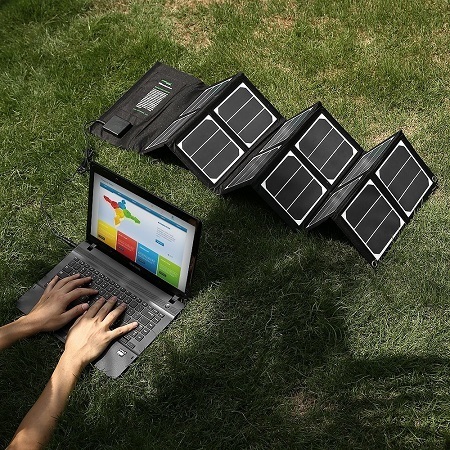
Situations Where Portable Solar Chargers are Beneficial
These panel chargers were created to be used in a broad range of scenarios, all of which obviously involve being outside – are at least within the sunlight.
Camping
Although activities such as camping are often used as a way to get away from city life and into the wilderness, the need for things like smartphones isn’t negated. After all, phones are more than just talking and texting devices now. They are our guides, radios, recipe books, memo pads, and calendars.

Bringing along electronic devices is definitely not unheard of when camping. Cameras, tablets, and even lights can be powered and recharged via USB connections.
Most of these devices can hold a charge for however long, but it’s going to end at some point. If you are away from additional electrical sources such as a car, you are completely out of luck when your device finally runs out of charge.
Solar panel chargers are an easy remedy to the situation, and can be used to keep your small devices going throughout the day, and even overnight if you’ve had the chance to leave the panel in the sun long enough. With solar panel chargers, you can always be sure that your essential devices are powered throughout your camping stay.
Backpacking and Hiking
Activities like backpacking and extended hiking trips can be more intensive and remote than simply camping out at your local campground. When backpacking, your excursion can often last for several days, making you reliant upon the gear you have with you.
Many hikers and backpackers are now using smartphones as their GPS device and compass, relying upon it to show them the way during the journey. Smartphones can also be used as cameras to document the trip, as well as way to get ahold of help if you find yourself in trouble.
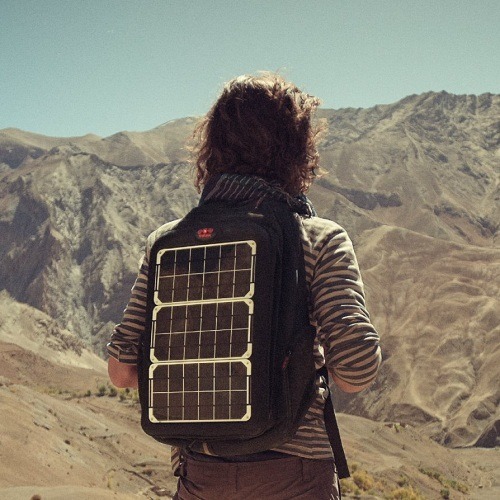
Obviously, smartphones can barely make it through the day on a full charge as is, let alone when running applications such as GPS programs. If you are going to be doing this, you need a way to keep your phone charged while being away from electricity.
Solar panels are the perfect solution. You can either set your panel up during breaks from travel, or strap it to your backpack facing towards the sun while you are on foot, helping it to charge your device as you walk.
Many solar panel chargers are manufactured to be very durable, along with being waterproof. This means that you can bring along portable power in confidence without worrying about the panel failing you in the middle of a trip.
Boating
Going out on a boat for the day is a perfect example of being without electrical power for your smaller devices. GoPros, cameras, and smartphones are all pretty standard items to bring along for a day on the lake or ocean, and extensive use will drain your batteries fairly quickly.
With a solar panel charger on your side, you can enjoy your time on the water with the full assurance of being able to recharge when needed.
Emergencies
Your phone is one of the most important things you should have on you in the event of an emergency. If you find yourself stranded away from a power source in an emergency situation with a phone on low battery, your situation will probably worsen when the battery reads zero.
This can happen in numerous scenarios, including dealing with a broken down car in the middle of nowhere. In such a situation, a fully charged phone could be your biggest ally when trying to get help. If your car can no longer stay on, a solar panel charger could then be used in its place to keep your phone going until help arrives.
Solar panel chargers can also be used during power outages in the daytime at your home. Keeping one on hand ensures you with a way to have at least some measure of power for essential devices during daylight hours.
The Best Solar Panel Chargers
There are several solar panel chargers available in today’s market. Some of the best models include panels from Goal Zero, RAVPower, and Nekteck.

When purchasing a solar panel charger, be sure that it can meet the needs you’ll require from it. Considering factors such as wattage, charge time, available outlets, weight, and size will go a long way in helping you pick the unit that is right for you.

